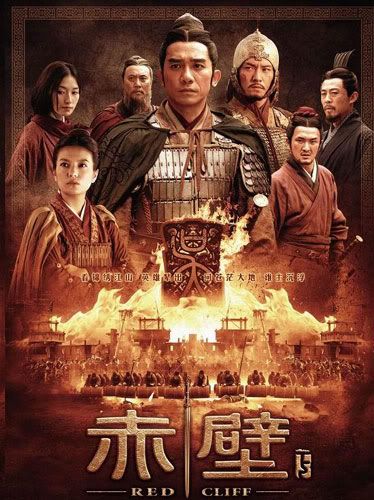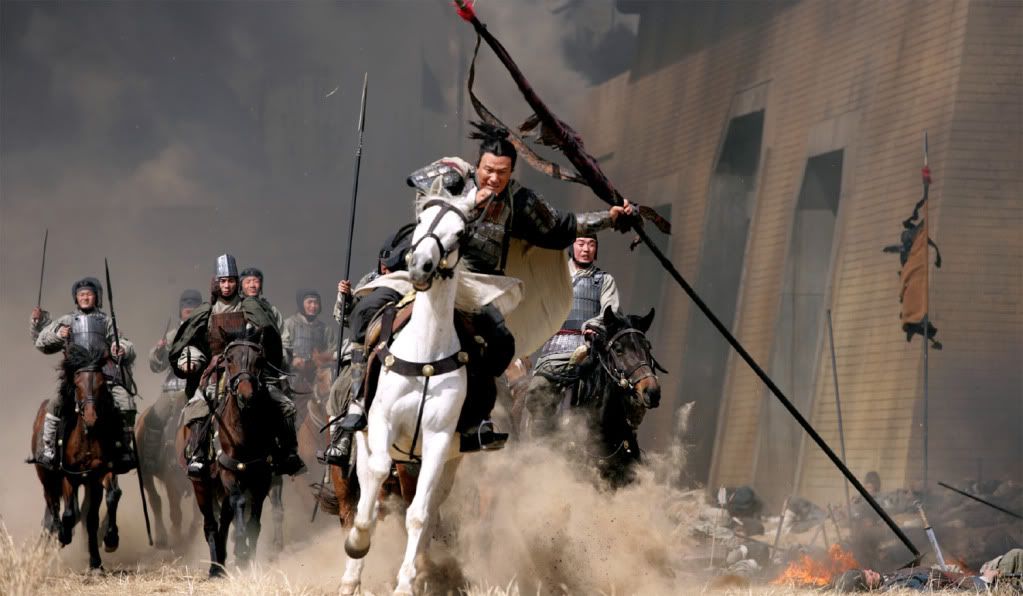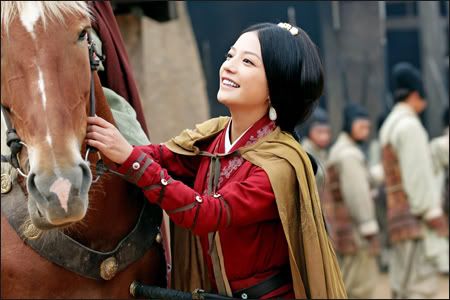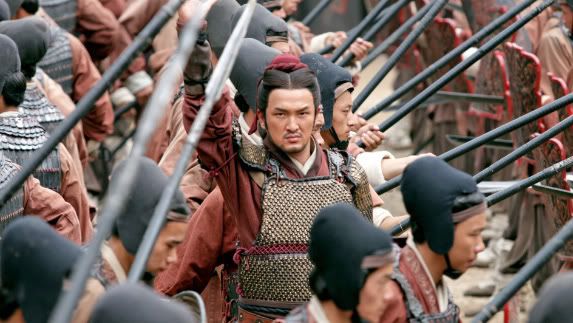Red Cliff

Title: Red Cliff
Rating: 4/5
Genre: Action/Drama
Starring: Tony Leung Chiu Wai, Takeshi Kaneshiro, Fengyi Zhang
Director: John Woo
Language: Chinese
 There are few things I despise more than being told to piss off and wait for an undisclosed amount of time whilst the director rakes in the money and prepares to tell you how it all ends, a major reason why I stalled watching this two-part film that can only really be described as 'epic' in nature, but amongst them are excessive cuts detrimental to the story. If a film is lengthy it should deserve that run time, and many a great film is long simply because it has a lot of story to tell; Love Exposure managed an impressive four hours and yet the pacing there is anything but slow. There is an abridged version of this film that managed to cut everything down to a little over two hours dubbed the 'international version,' perhaps fearing peoples response to the four-and-a-half hour run time, but even if it takes you two separate sittings, watching the first part to return a few days later for this re-telling of one of the bloodiest and perhaps most fascinating wars in human history, then it is well worth the effort. Personally, it took me two snack breaks and a 30 minute interval.
There are few things I despise more than being told to piss off and wait for an undisclosed amount of time whilst the director rakes in the money and prepares to tell you how it all ends, a major reason why I stalled watching this two-part film that can only really be described as 'epic' in nature, but amongst them are excessive cuts detrimental to the story. If a film is lengthy it should deserve that run time, and many a great film is long simply because it has a lot of story to tell; Love Exposure managed an impressive four hours and yet the pacing there is anything but slow. There is an abridged version of this film that managed to cut everything down to a little over two hours dubbed the 'international version,' perhaps fearing peoples response to the four-and-a-half hour run time, but even if it takes you two separate sittings, watching the first part to return a few days later for this re-telling of one of the bloodiest and perhaps most fascinating wars in human history, then it is well worth the effort. Personally, it took me two snack breaks and a 30 minute interval.As the name implies, this epic tale revolves the infamous battle for Red Cliff; the seasoned war veteran and Prime Minister for the Han Emperor, Cao Cao, convinces the young emperor that there are rebel forces led by Lui Bei and Sun Quan to the south and in order to quash the uprising should take their superior numbers and conquer the land by force. Lui Bei, with many loyal generals under his command stands his ground but their overwhelming numbers soon force them from their land and they are given little option but to send their chief tactician, Zhuge Liang, to forge an alliance with Sun Quan. Joining at the riverside stronghold of Red Cliff, Zhuge Liang and Sun Quan's viceroy, Zhou You, embark on a war with the treacherous Cao Cao; a dangerous game involving spies, assassins, biological and psychological warfare, precision tactics, and plenty of bloodshed before either side can claim victory.
Each character has their own distinct personality and method of doing battle; Zhang Fei's 'Gimli-like' approach involving a number of amusing moments where he roars or charges head first into the enemy unarmed, punching people with his fists as he runs; Sun Shung Xiang's glee as she taunts the men who thought her incapable of battle by beating them at their own game; or Gan
 Ning's almost complete absence of honour having originally been a pirate now loyal to the young Sun Quan. There isn't a single character who hasn't been given considerable research and there is time devoted to developing them, if perhaps – dare I say it – a little more could have been done to show us the rest of the cast; Guan Yu for example, rarely being seen outside of battle. Even the three kingdoms themselves are given their context, with each leader displaying a unique approach to dealing with situations as they arise, governing three wholly different states and with their own concerns.
Ning's almost complete absence of honour having originally been a pirate now loyal to the young Sun Quan. There isn't a single character who hasn't been given considerable research and there is time devoted to developing them, if perhaps – dare I say it – a little more could have been done to show us the rest of the cast; Guan Yu for example, rarely being seen outside of battle. Even the three kingdoms themselves are given their context, with each leader displaying a unique approach to dealing with situations as they arise, governing three wholly different states and with their own concerns. But the behind the scenes affairs are of course only one side of the story, and no slack is given to the long and arduous battles that are steadily built up through the dialogue. Each general, as already mentioned, has their own way of doing battle and this comes through strongly in the choreography, and unlike perhaps films such as 'Troy' where we were only really concerned with seeing Achilles do battle, there are enough characters on display such that it never really gets tiring. And yet, this in itself isn't the highlight; the manner in which the battles are conducted are instead so ingeniously portrayed; half 'Kagemusha' and half '300,' it combines an element of stylised action sequences with enough emphasis on the details; the formations, tactics and trickery employed to give their side the edge whilst maintaining an odd façade of honour that allows you to employ assassins but let fearsome warriors walk out of respect.
The tale of Red Cliff, and in particular the pivotal character of Zhuge Liang who I've ranted about through other means on how much of a freakin' tactical genius he was, was one that I knew vaguely; the names used in 'Dynasty Warriors' telling pieces of this saga – both derived from the book “The Romance of the Three Kingdoms” written way back in the 14th century and in itself with its own inaccuracies stemming from fact that its been over a millennia since the events occurred – but here it is given so much more life, consolidating the finer points with a clarity that if he decided to continue with other parts of the book would have me queueing first in line. When I went into Kurosawa's well regarded 'Kagemusha,' I was looking for something
 grandiose in scale; something with as much to do with the battle as the scenes behind it; the devious plotting and conspiracies, plans executed and occasionally gone wrong. I wanted the sense of realism that I was actually there, transported across the lands through time and invested in the lives of the unique characters that I understand at least to some degree and lending weight to the events of the battle; tactics gone awry, responding to traps lain and then the ensuing counter-reactions. Where Kagemusha stumbled, Red Cliff does not. This naysayer has been dubious of Woo's work since he stopped collaborating with Chow Yun-Fat but with Red Cliff he has his masterpiece, and sadly too few people seem to have noticed.
grandiose in scale; something with as much to do with the battle as the scenes behind it; the devious plotting and conspiracies, plans executed and occasionally gone wrong. I wanted the sense of realism that I was actually there, transported across the lands through time and invested in the lives of the unique characters that I understand at least to some degree and lending weight to the events of the battle; tactics gone awry, responding to traps lain and then the ensuing counter-reactions. Where Kagemusha stumbled, Red Cliff does not. This naysayer has been dubious of Woo's work since he stopped collaborating with Chow Yun-Fat but with Red Cliff he has his masterpiece, and sadly too few people seem to have noticed.
Comments
Post a Comment